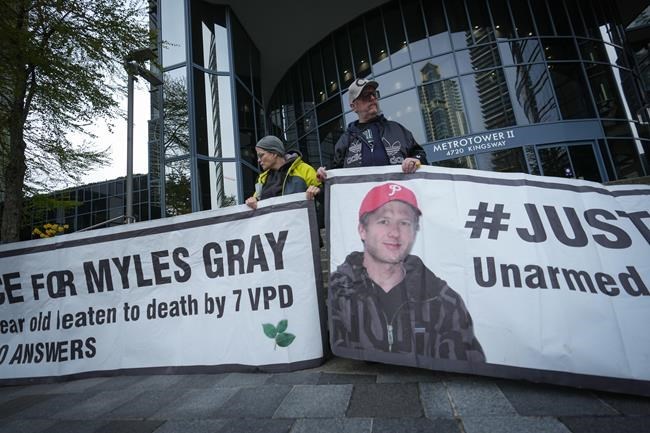BURNABY, B.C. — A Vancouver police officer told a British Columbia coroner's jury Wednesday that he punched Myles Gray in the head as hard as he could several times because he didn't think anything else would work to subdue the man, other than shooting him.
Const. Kory Folkestad testified on the third day of the inquest into Gray's death on Aug. 13, 2015, after a beating by several officers that left him with injuries including a fractured eye socket, a crushed voice box and a ruptured testicle.
Folkestad's partner, Const. Eric Birzneck, later testified that he had initially talked to Gray in an attempt to de-escalate the situation, but Gray's demeanour changed.
Gray, 33, put his head down and "he started coming at me," Birzneck told the inquest.
That's when Birzneck deployed pepper spray, he said, and a struggle ensued to wrestle the 33-year-old to the ground and apply handcuffs.
Gray displayed "surges of incredible strength" as three officers tried to restrain him, Birzneck told the jury in Burnaby, B.C.
Birzneck said he now works as a use-of-force training officer and at the time of Gray's death he was a trained crisis negotiator.
That training dealt "quite heavily" with mental health-related calls, he said.
Birzneck was also trained to use pepper spray, a baton, a long rifle, a handgun and a device that shoots rubber bullets when in a crowd-control situation, he said.
On that day in 2015, Birzneck had his gun, a baton and pepper spray, he said.
Birzneck told the inquest that he thought mental health, drugs, or a combination of both potential factors were affecting Gray's behaviour.
A statement from the BC Prosecution Service in December 2020 — when it announced its decision not to pursue charges against the officers involved in Gray's death because it could not prove an offence had been committed — said toxicology evidence showed Gray had the drug kratom in his system.
Gray's sister, Melissa Gray, told the inquest on Monday that he'd been diagnosed with bipolar disorder while he was in high school, but he'd been stable ever since.
Folkestad testified earlier Wednesday that he and Birzneck were in plain clothes when they responded to a call for immediate assistance from a uniformed officer.
When the three officers found Gray in a yard, Folkestad said he believed Gray wanted to fight them and at one point he "tensed every part of his body" and roared.
"All of a sudden, he just ripped his arms out from us and squared off with us with a speed and strength I couldn't believe," Folkestad said.
Folkestad, who told the jury he has been diagnosed with PTSD because of the incident, said he struck Gray in the face multiple times as hard as he could.
"I didn't think anything else would work at the time and we would have to shoot him," he said.
At one point during the confrontation, Folkestad said he was knocked unconscious.
The officers couldn't let Gray go free based on his behaviour leading up to and during the altercation with police, Birzneck told the inquest in response to a question from a lawyer for the Vancouver Police Department.
Gray was "arrestable for assault" based on an initial report that he had sprayed a woman with a garden hose and his behaviour toward police, Birzneck said.
After another bout of "superhuman strength" in which Gray was able to "power out" of Birzneck's grip, the officer testified that he applied a "vascular neck restraint."
Birzneck said the manoeuvre involves applying even pressure on both sides of the neck in an attempt to reduce blood flow and induce temporary unconsciousness.
He said he applied the hold twice, but Gray did not lose consciousness as a result.
Birzneck said he held on until another officer told him that they had Gray handcuffed.
The officer testified that he did not reach for the front of Gray's throat, as the manoeuvre he used involved applying pressure to the sides of the neck.
Birzneck said he left the yard soon after releasing the hold, telling the jury that he recalled that Gray's face was red, but he did not remember seeing blood or bruising.
The three officers who have testified so far have each said they don't know who applied a "hobble" strap to Gray's legs in order to immobilize him.
Birzneck said he didn't have a hobble with him and he doesn't recall his partner having one either, so he assumes it came with one of the additional backup officers.
Several other Vancouver police officers are expected to testify at the inquest.
The jury won't be able to make findings of legal responsibility at the inquest but may make recommendations to prevent similar deaths in the future.
This report by The Canadian Press was first published April 19, 2023.
Ashley Joannou and Brenna Owen, The Canadian Press

